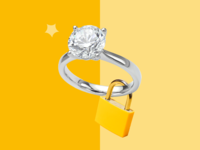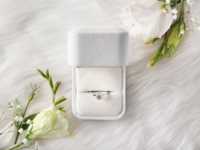Platinum vs. White Gold: Which Is Better for Engagement Rings?

As with any decision when it comes to jewelry, choosing your engagement ring metal is a matter of personal preference. But when it comes to platinum versus white gold, in particular, the decision is a little more nuanced, because the two metals look very similar.
Each has its pros and cons: White gold is generally less expensive than platinum in engagement ring settings; platinum is more durable and requires less maintenance. The composition of each has a large impact on things like pricing and durability. "Most platinum used in jewelry is close to pure platinum," explains Manhattan-based jeweler Ashley Zhang, "[while] white gold is a mixture of yellow gold and other metals like silver, zinc and nickel." (Note that it doesn't make much difference if you're comparing 14k or 18k white gold versus platinum, though 18k will be closer to the cost of platinum than 14k. "Platinum is typically compared more to 18k gold as both are more expensive and more pure metal than 14k gold," Zhang says.)
Below, we outline the key differences between platinum versus white gold engagement rings, including the subtle differences visible to the naked eye, pricing, care and more.
In this article:
- Platinum vs. White Gold: The Main Differences
- Platinum vs. White Gold: Can You See the Difference?
- Platinum vs. White Gold Engagement Ring: Which is Best?
Platinum vs. White Gold: The Main Differences
Though they're often hard to see, the qualities of white gold versus platinum vary quite a bit. Here are a few of the biggest differences between the two.
Durability
"Platinum is a more durable metal than white gold," Zhang says. "White gold, as an alloy, can lose metal and thin out over time." If you're someone who works with your hands and wants to wear your ring while doing so, a more durable metal is ideal. (Regardless of your selected metal, you should be sure to insure your engagement ring.)
Care
"Platinum is generally considered easier to maintain; it does not tarnish or change color like white gold can," Zhang explains. "White gold is often plated with white rhodium, which is a metal from the platinum group. This plating can wear off over time, exposing the naturally warmer tone of white gold. Depending on how often you wear white gold jewelry, you would need to have it replated every one to three years." You'll want to maintain platinum with regular cleanings, of course, but the metal itself won't wear or tarnish over time.
Cost
Pound for pound, white gold is more expensive, but when it comes to platinum versus white gold cost in jewelry, a platinum piece will cost you more. "White gold is technically more expensive as the gold price has now reached an all-time high," Zhang explains. "However, because platinum is heavier and more of it is required to make a piece, it ends up costing more. The metal is also harder, so it is more labor-intensive to work with while creating jewelry, which also adds a cost to your final ring."



Allergens
It's worth noting the allergens, or lack of them, in metals. "Platinum is generally considered hypoallergenic," Zhang says. White gold, on the other hand, often contains nickel, which can be irritating to some or otherwise affect those with a metal allergy. (Check with your jeweler, of course, as some varieties of white gold can be blended without nickel.)
Platinum vs. White Gold: Can You See the Difference?
If you're debating white gold versus platinum for an engagement ring, you'll want to consider the subtle differences that can be seen. The short answer is yes, you can see the difference between these two engagement ring metals, but you have to look closely. "There are subtle differences one can see," Zhang says. "Platinum has a natural silver-white color with a hint of gray, while white gold has a brighter, whiter shine due to the rhodium plating." Platinum versus white gold color varies even more as the rhodium plating wears off of white gold, though. "Without the rhodium plating, the differences are even more noticeable as the white gold will have underlying yellow tones," Zhang says. You'll need to keep up with replating in order to maintain the vibrant white shine of white gold.
Platinum vs. White Gold Engagement Ring: Which is Best?
"We always recommend platinum for an engagement ring," Zhang says. It is typically preferred over white gold for a variety of reasons. That said, there is no one "right" answer; ultimately, choosing a platinum versus white gold ring should come down to which of the pros and cons matter most to you. Here, Zhang helps break them down.
Platinum: Platinum has the most items in the pros column. It's the most durable, it's hypoallergenic and, importantly, it's the lowest maintenance. You'll want to clean your engagement ring, of course, but that's all it takes to keep your platinum engagement ring looking shiny and sharp. As for the cons? "Cost, as it's the most expensive," Zhang says. "And weight. It's heavier, [but] this may only be a con for those who are not used to wearing rings."
18k White Gold: The biggest pro of 18k white gold is the subtle color shift; this metal has a brighter, whiter color due to the white rhodium plating. On the con side, it requires maintenance to maintain that color with eventual replating. It is also not hypoallergenic.
14k White Gold: The most notable difference in 14k white gold versus platinum is the cost: 14k white gold is more affordable than both platinum and 18k white gold, which is a pro. But when it comes to 14k versus 18k gold, both require replating and more maintenance overall than platinum.




















